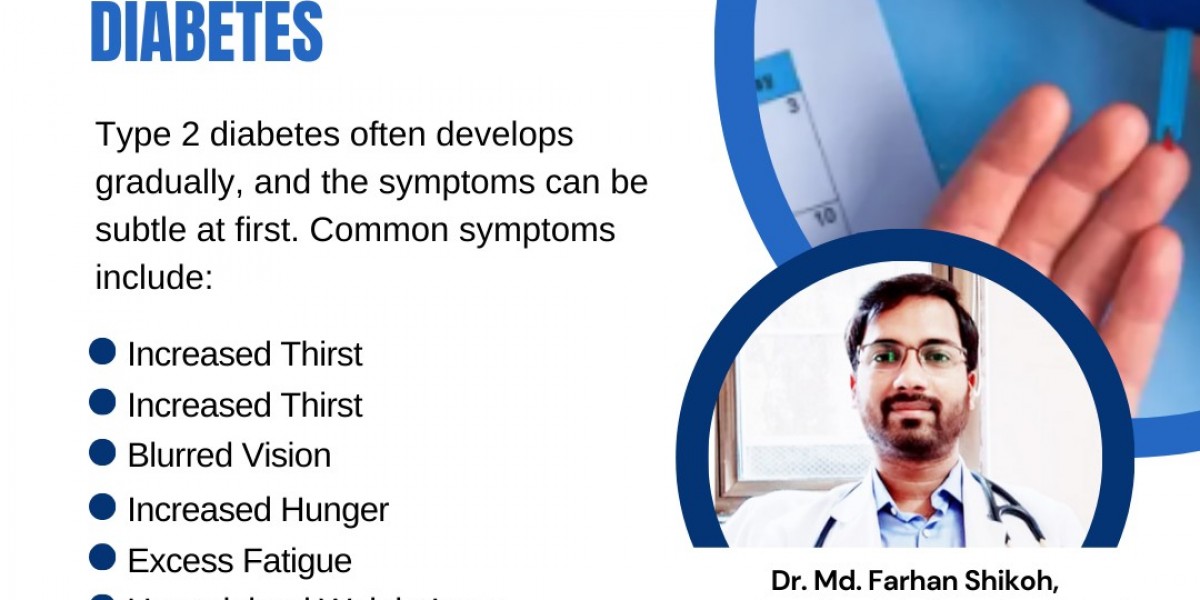Type 2 diabetes is a chronic condition that affects the way your body processes sugar (glucose). It’s often a silent condition, developing gradually over time, and many people may not recognize the signs until the disease has progressed. Early detection and management are crucial to preventing complications. Below are some common symptoms to watch out for if you suspect you might have type 2 diabetes.
1. Increased Thirst and Frequent Urination
One of the most noticeable symptoms of type 2 diabetes is an increase in thirst, which can lead to drinking more fluids throughout the day. This can be accompanied by frequent urination, particularly at night. High blood sugar levels cause the kidneys to work harder to filter and absorb excess glucose, leading to dehydration and the need to urinate more frequently.
2. Fatigue
Feeling unusually tired or fatigued is a common symptom of type 2 diabetes. When the body is unable to use insulin properly (a condition known as insulin resistance), glucose is not absorbed into the cells as efficiently, depriving them of energy. As a result, individuals with type 2 diabetes often experience a lack of energy and feel fatigued more easily.
3. Blurred Vision
High blood sugar levels can cause fluid to be pulled from the lenses of the eyes, affecting the ability to focus. This can lead to blurry vision. If left uncontrolled, this symptom can become more severe, potentially leading to long-term vision problems, such as diabetic retinopathy.
4. Slow Healing of Cuts and Wounds
People with type 2 diabetes may notice that their cuts and wounds take longer to heal. High blood sugar can damage blood vessels and reduce circulation, slowing down the body's natural healing process. As a result, even small cuts or injuries may take longer to recover.
5. Unexplained Weight Loss
While some people with type 2 diabetes may experience weight gain, others may notice unexplained weight loss despite eating normally. This occurs because the body starts breaking down muscle and fat for energy due to the inability to effectively use glucose.
6. Tingling or Numbness in Hands or Feet
Nerve damage (neuropathy) is a common complication of diabetes. High blood sugar levels can cause nerve damage, leading to a tingling or numb sensation in the hands, feet, or legs. This symptom is often one of the first signs that diabetes is affecting the nerves.
7. Increased Hunger
When insulin is unable to move glucose into the cells, the body begins to crave food more frequently. Despite eating, the cells do not receive the energy they need, causing increased hunger as the body seeks more fuel.
8. Darkened Skin
Some people with type 2 diabetes may notice dark, velvety patches of skin, especially in areas like the armpits, neck, and groin. This condition, known as acanthosis nigricans, is often associated with insulin resistance and can be an early sign of type 2 diabetes.
9. Frequent Infections
People with type 2 diabetes are more prone to infections, particularly urinary tract infections, skin infections, and fungal infections. High blood sugar levels can weaken the immune system, making it harder for the body to fight off infections.
When to Consult a Doctor
If you or someone you know is experiencing any of these symptoms, it’s important to seek medical advice promptly. Early diagnosis and treatment are key to managing type 2 diabetes effectively and preventing complications.
Dr. Md. Farhan Shikoh, Best Heart Specialist in Ranchi, MBBS, MD (Medicine), DM (Cardiology), specializes in cardiovascular health and diabetes management. Individuals experiencing symptoms of type 2 diabetes can contact Dr. Shikoh for a consultation at Sukoon Heart Care, Sainik Market, Main Road, Ranchi, Jharkhand: 834001. To schedule an appointment, call 6200784486 or visit Dr. Farhan Shikoh's website.








